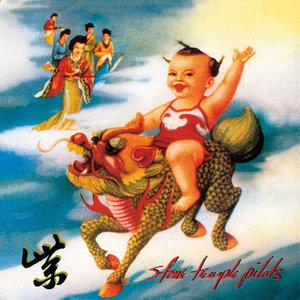Published on Mar 8, 1998
In 1994, Stone Temple Pilots were standing on the edge of
greatness. Having made a name for themselves with their debut
effort
Core in 1992 and their alternative hit “Plush,” lead singer
Scott Weiland and crew had carved out a nice niche for themselves
on both the alternative and rock worlds.
Some people wondered how STP would follow up their original
success. The answer was simple:
Purple, their sophomore effort, could be the best album of
this band’s brief career – and with the drug problem that sidelined
Weiland, left a question of what could have been had he not screwed
up his life.
The first taste anyone got of
Purple was “Big Empty,” a song included in the movie
The Crow and on its soundtrack. From the slide guitar of
Dean DeLeo to the thundering drums of Eric Kretz, this song
captured the power that the band had wanted to express all along,
and was one of the better songs on the soundtrack. It also was a
tasty carrot to dangle in front of the fans waiting for
Purple to come out.
But as good as “Big Empty” was, it was not the best song on
Purple, a fact that was obvious once it finally hit the
stands. From the opening chord crunches of “Meat Plow,” Stone
Temple Pilots are on a creative roll. Weiland is in fine form, and
shows his musical wisdom by knowing when to be more subdued with
his vocals (“Lounge Fly,” recorded at Paisley Park Studios) and
when to go all out (“Unglued”).
Surprisingly, all the radio-friendly songs have not lost any of
their edge four years since the album was released. “Interstate
Love Song” quickly builds from a light acoustic sound to the power
chords that make this song special, and Weiland again shows his
power in his vocal restraint. The five-star
tour de force, “Vasoline,” rolls out the funk and roll, and
gives each musician (including bassist Robert DeLeo) a chance to
strut their stuff. (The video for this song is also a high-water
mark – almost makes MTV worth watching.)
But the best song on the album is one you probably won’t hear on
the radio – “Pretty Penny,” a song which allows STP to go unplugged
and introspective. Funny thing is, after all the powerful guitars
and vocals, it
works, and works well. The vocal harmonies and the guitar
bridges are especially worth checking out. Likewise, “Still
Remains” is one song which could have fit on the radio, but for
some reason didn’t make the cut to be a single.
But once you get to the end of track 11, “Kitchenware &
Candybars,” don’t hit the “stop” button yet – the uncredited
twelfth track is a lounge-act number featuring a singer that can’t
be Weiland. For that matter, one wonders if the other members of
the band play on this track – still, it’s worth checking out at
least once for the kitsch factor.
Purple rightfully became Stone Temple Pilots’ first
chart-topping album, and is worth adding to your collection. Even
if you’re not a fan of alternative music, this album might just
change your mind.
